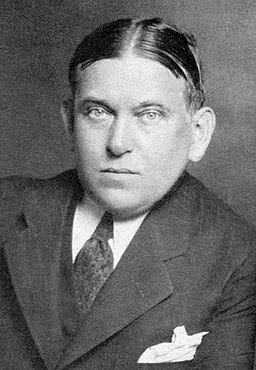Getting to Know H.L. Mencken

I occasionally surrender to a Mencken spree. It’s something I’ve been doing since the early 1990s when I bought my first Mencken books: three cheap paperback editions of Mencken essays that I found at The Dawn Treader Bookstore in Ann Arbor.
I’ve recently been reading the essays, articles, and reviews he repackaged and issued in the six-volume set, Prejudices, as well as the writings from the Second Mencken Chrestomathy that Mencken biographer Terry Teachout edited in the early 1990s.
The Sage of Baltimore was the biggest writer in the 1920s, which was “peak literary culture,” immediately before the Golden Age of Radio in the 1930s.
Print was entertainment. Few entertained as well as Mencken.
And he entertained and entertained and entertained. Toward the end of his life, he speculated he wrote well over 5,000,000 words.
No finer prose has been written by an American
Mencken assumed that his works would have a short shelf life, since he wrote mostly about the “portentous” issues of his day. “Period pieces,” we might call them.
But no. They’ve endured. Why? It’s a mystery (Teachout: “baffling”).
Maybe it’s because, in Teachout’s words, “no finer prose has been written by an American.” Maybe it’s because he blasted away at that Puritan Progressivism that still afflicts us (its ideology stained Plymouth Rock in 1620 and splatters Catholic statues in 2022). Maybe it’s because he mocked the freaks of his day, just like we would mock the freaks of our day if we had the guts.
Or maybe it’s because his prose is full of common sense, even if his godlessness jars our Christian ears occasionally. Teachout back in 1994 called Mencken “the apostle of common sense.” That’s what EWTN called Chesterton in its 2000 TV series. I don’t know which great writer got that coveted label first, but no matter. Both deserve it. Now, if we could just find ten more writers to round out the twelve.
But maybe we still read Mencken for the same reason they read him in the 1920s: he entertains. His outrageousness slays me.

I read P.J. O’Rourke in the 1980s and 1990s, even after learning he referred to the diverse folks of the Asian Steppes as the “urine-colored people.”
These writers might be dicks, but their outrageousness involuntarily amuses me.
Every Mencken piece has at least one, usually a million, pejorative references. Everyone beneath or different occupies a level on the old mental disability scale: “moron,” “imbecile,” or “idiot.” Politicians, if they rise above the level of morons, are still “third-rate men.” Bad novels are “the veriest twaddle.”
On top of that, his style and grammar are immaculate. I take comfort, knowing every Mencken sentence and paragraph is grammatically and stylistically correct, even if wrapped in the 1920s idiom that might shock my woke contemporaries. I have little doubt that I’m a “moron, imbecile, and idiot” for shaking my head but snickering every time Mencken uses the word “blackamoor.”
Ah, but this paean has gone on long enough. I want to finish reading his “Commonwealth of Morons.”
Recommended Treatment?
My daughter, Meg, bought me this book for Christmas (Amazon link), prompting me to publish the above micro-appreciation. I'll let you know how I enjoy it.

Subscribe to my Saturday morning email newsletter, Outside the Modern Limits. It’s free. Heck, I don’t even try to “up-sell” anything.
Cover photo by Breanna Klemm / Unsplash
Inline photo by Ben Pinchot, Public domain, via Wikimedia Commons




